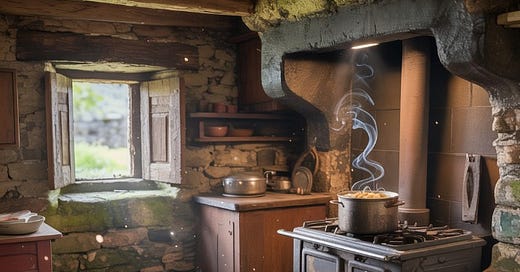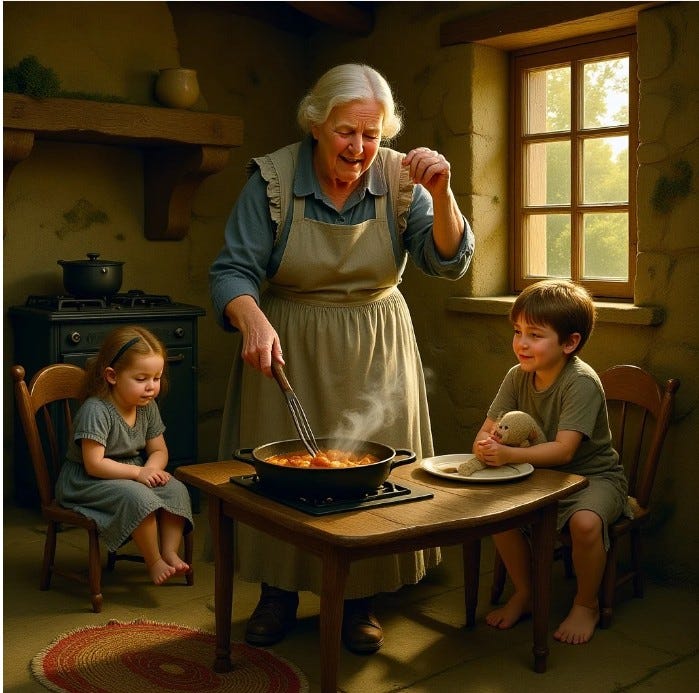Image by Ideogram 3.0 June 2025
Questions for Harriet: 🌿 Harriet Allery (1819–1888) — Totnes, Devon!
My imagined visit to her in a modest cottage in the 1870s, a widow reflecting on a life of rural devotion, continues.
What was it like to marry at fifteen—were you frightened, excited, or both? How did you manage a household with so little and still raise three children? When you go to the Totnes market, what do you look forward to most? Do you remember a moment in your life as an Innkeeper's wife when you felt truly proud? What remedies or cures did your mother teach you that still serve your family? How did you feel when the railway came through—hopeful, or wary of change? If you could choose one hymn to be sung at your funeral, which would it be?
What do you remember most about your mother’s kitchen secrets?
Chapter 8: Secrets of the Kitchen Table
“A pinch of salt, a sprig of thyme, and don’t stir widdershins—my mother’s ways still work.”
My kitchen table was more than a place to eat. It was where magic happened—the quiet kind, passed from mother to daughter without ceremony. With my sleeves rolled up and my hair tied back, I mashed the roots with the heel of a spoon, kneaded the dough until it sighed beneath my hands, and ground dried rose petals into powder between sheets of wax paper.
My mother had taught me all of it, not through formal words but in shared silence and soft murmurs. “A pinch more salt,” she’d say, “and don’t stir widdershins, mind—it turns the spell the wrong way.” I half believed her. I still do.
Above the stove, I hung a bundle of herbs tied with twine: peppermint for bellies, sage to fight fever, and lavender to calm restless sleep. My pantry held jars of vinegar steeped with elderberries or wild garlic. If someone coughed, I had a syrup. If they fretted, I brewed tea. I didn’t always know if it cured—but it comforted, and that was often enough.
At that table, my children learned things you won’t find in school primers. They watched how I moved, how I cleaned as I cooked, and how I tested a loaf by sound. They listened to my rhymes for remembering and learned that nothing—nothing—is wasted if it’s made with care. Even the crusts of bread have a purpose. Even thin days deserve grace.
Neighbours came, sometimes with empty pie plates, sometimes with full hearts. I’d pour tea, cut a slice of whatever I had, and offer what I could—advice, a remedy, or just a story to ease the ache. The kitchen was warm in more ways than one.
To me, cooking was never just about food. It was care made visible. Recipes were the stories I didn’t always have words for. Remedies were a way of saying “I see you” without needing to say anything at all. And that table held it all—my hopes, my grief, my healing, and my love
Image by Flux-1 Kontext, June 2025
Widdershins is an old term meaning to move counter-clockwise, anti-clockwise, or in a direction opposite to the usual, specifically, opposite the apparent motion of the sun in the Northern Hemisphere. The word comes from Middle Low German, literally translating to "against the way," and it has deep roots in British and European folklore.
In traditional beliefs, moving widdershins—especially around a sacred place like a church—was thought to bring bad luck or even open portals to other worlds, as seen in stories like “Childe Rowland.” In modern witchcraft and ritual practice, the widdershins movement is often reserved for banishing or undoing actions, symbolising the reversal or breaking of negative influences.
So, in the phrase “don’t stir widdershins,” your mother is reminding you not to stir counter-clockwise—a superstition that echoes old beliefs about luck and the power of ritual direction.
Genealogy Assistant Ms Perplexity
Reflection Prompt:
What recipes or remedies carry memory in your family? Who was the keeper of those traditions, and how have they flavoured your own life?







